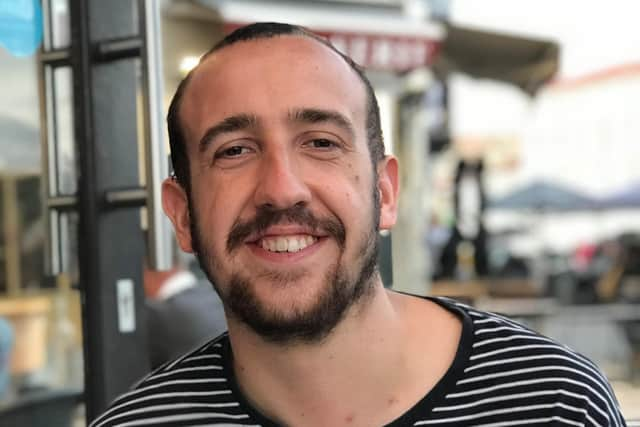Hospital fall did not cause the death of Leeds student, inquest hears
and live on Freeview channel 276
David Nash died at Leeds General Infirmary (LGI) on November 4 in 2020 after an abscess, which developed as the result of an untreated infection in his right ear, cut off the blood supply to his brain stem.
He had four telephone consultations with staff at his GP surgery in Leeds over a 19-day period, before he was admitted to hospital, and a review found he should have been offered an urgent face-to-face appointment after the final consultation as there were a number of “significant red flags”.
Advertisement
Hide AdAdvertisement
Hide AdHe was taken to the A&E department at St James's University Hospital by ambulance on November 2, suffering with pain in his neck, a headache, a fever and confusion, and a CT scan revealed severe brain swelling.


The University of Leeds law student then fell off a trolley and hit his head on a bedside table when a nurse left him to get medication.
An inquest into his death, held at Wakefield Coroner’s Court, heard he stopped breathing after the fall and had to be intubated and ventilated, before he was transferred to LGI for emergency surgery to relieve the pressure on his brain.
After undergoing two operations, doctors concluded that the brain damage was irreversible and he died at 6.24pm on November 4 after his family agreed to withdraw life support.
Advertisement
Hide AdAdvertisement
Hide AdDr Paul Murphy, a consultant in neurocritical care at the LGI, told the inquest: “I do not believe David’s fall from the trolley contributed to the tragic fatal outcome.”
He also said there was “no evidence of structural traumatic brain injury” and the abscess clearly caused the damage.
Dr Justin Murphy, a consultant ear, nose and throat surgeon, said treatment was “futile” by the time Mr Nash was admitted to A&E.
The doctor said Mr Nash may have been suffering with a chronic ear infection for “many months, if not years” and the condition could have been diagnosed and treated if he had seen an ear, nose and throat specialist in hospital when he began complaining about the pain in October.
Advertisement
Hide AdAdvertisement
Hide AdHe also said “it is possible it could have prevented” the onset of the brain abscess, which is “likely” to have developed when the fever took hold of Mr Nash a week before he was admitted to hospital.
Mr Nash had a telephone consultation with a GP at Burley Park Medical Centre in Leeds, due to concerns about lumps in his neck, on October 14. He was told an infection had caused his lymph nodes to swell and he would be booked in for a blood test.
Nine days later, he was prescribed ear spray antibiotics over the phone after he began feeling a pain in his right ear and jaw.
On October 28, he had a third telephone consultation, as he was suffering with ear pain and a fever, but had also found blood in his urine. A locum doctor diagnosed him with a urinary tract infection and prescribed antibiotics, but said a face-to-face appointment was not necessary.
Advertisement
Hide AdAdvertisement
Hide AdThe student phoned again on November 2, for the fourth time in less than three weeks, because he was suffering with pain in his neck, a fever and a headache.
An advanced nurse practitioner prescribed codeine for the pain and diagnosed him with an influenza-like viral illness over the phone, but said he did not appear to be seriously unwell and he did not need to be seen in person.
She also said he should not attend the practice for the pre-booked blood test because his fever was a symptom of Covid-19 and he needed to take a PCR test.
Earlier this week, the inquest was told Dr Alistair Bint, a GP specialist who reviewed the case, found that Mr Nash should have been offered an urgent face-to-face assessment at his GP practice on November 2, as his case “could not have been reasonably managed” over the phone.
Advertisement
Hide AdAdvertisement
Hide AdHe said that Mr Nash was given an unsafe diagnosis that morning, as he was displaying “red flag” symptoms of meningitis, including a fever, neck pain and headache that was affecting his sleep.
He also said the student could have been seen in hospital up to 10 hours earlier if he had been offered a face-to-face assessment that morning, but he could not say whether this would have saved his life.
Dr Johnson D'souza, who conducted a clinical review for NHS England, also concluded that Mr Nash should have been offered a face-to-face appointment.
Dr Neil Lawton, a GP partner at Burley Park Medical Centre, said the majority of consultations were being conducted over the phone at that time, due to Covid-19 restrictions, but “ the situation today is very different” and most patients are seen in person.
Advertisement
Hide AdAdvertisement
Hide AdHe accepted that Mr Nash should have been seen in person, adding: “I get the impression it would have been more obvious how ill he was if we had seen him in the flesh.”
On the first day of the inquest, Anne Nash told the coroner’s court her son was a “kind, sensitive, intelligent adult”.
“We continue to gain strength from you and you remain a strong presence in our lives. As David’s mum, I too am eternally grateful for an amazing 26 years of love and hilarity,” she said.
“Your huge smile, your compassion and your ability to enjoy every moment could never be replicated.”
The inquest continues.